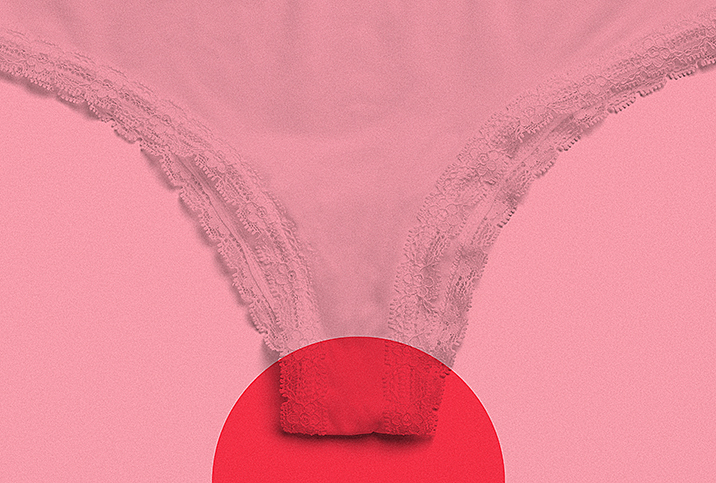What Is a Decidual Cast?

Madi Swegle, a 28-year-old nurse in Iowa, knows a thing or two about periods. But even she had never heard of a rare phenomenon known as a decidual cast—until it happened to her.
In a viral TikTok video, Swegle described how her cycle started as usual, but within a few hours, she began to experience consistent, nauseatingly intense cramping.
"This pain is the worst pain I've honestly felt in my entire life," she recalled in the video.
Swegle said she sat on the toilet with a heating pad and a bucket for an hour, thinking she was having a nightmarish period. Finally, something came out, and the cramps stopped.
"At first, I thought it was a massive blood clot, but it wasn't," Swegle said. "It was tissue about the size of my palm and it was in the perfect shape of my uterus. It was terrifying to see it come out of my body."
Swegle sent a photo to her OB-GYN, who informed her it was a decidual cast.
"A decidual cast is an intact and often large triangular-shaped piece of tissue that passes through the vagina, often when menstruation would typically occur. It represents the entire uterine [endometrial] lining, which is passed in one intact piece," said Alyssa Dweck, M.D., sexual health and reproductive expert for Intimina and gynecologist in Westchester County, New York, in an email interview. She added that the medical term for a decidual cast is membranous dysmenorrhea.
During the second half of the menstrual cycle, the body takes several steps to prepare for a potential pregnancy. This preparation includes building up the uterine lining, also known as the endometrium, in a process known as decidualization. Usually, if no pregnancy occurs, the thickened tissue—called the decidual lining—breaks apart and sheds gradually over five to seven days. A decidual cast occurs when the entire lining is shed instantaneously instead.
"This is a relatively rare occurrence, but the incidence is likely underestimated since many don't report it," Dweck said. "Passing a decidual cast can be frightening, very painful and is often mistaken for miscarriage."
What causes a decidual cast?
Mokerrum Malik, M.D., an OB-GYN at the University of Maryland Medical Center and assistant professor at the University of Maryland School of Medicine in Baltimore, said the exact mechanism that causes decidual casts isn't known. However, there's a strong association with hormonal medications, particularly contraceptives. The hormone progesterone, she explained, keeps the endometrial lining intact to support a pregnancy. Progestin, a synthetic form of progesterone used in hormonal contraceptives, has a similar effect. A few studies, including a case report by Malik published in Fetal and Pediatric Pathology, have found an association between starting or stopping hormonal treatments and decidual casts.
She said the idea is that progestin thickens the uterine lining. When there's no pregnancy and the lining must be shed, it's so thick that it remains intact and exits in one piece, rather than breaking up and shedding gradually.
Intrauterine infections, or infections of the uterine lining, can contribute as well, Malik said. The most prominent is pelvic inflammatory disease (PID), which can result from sexually transmitted infections (STIs) such as chlamydia and gonorrhea, she said.
"They can cause endometritis, where there's an infection of the inside lining," she said, explaining that the infection can cause the lining to swell and thicken.
"When the lining is then shed at the time of the period, because it's so thick and swollen, it's not able to break up appropriately," Malik said.
An ectopic pregnancy, a potentially life-threatening condition in which pregnancy develops outside the uterus, may also increase a person's risk of developing a decidual cast, according to Dweck.
What are the symptoms of decidual cast?
Before passing a decidual cast, a person may experience bleeding, spotting and severe cramps, as Swegle described.
"Passing a large piece of tissue can be painful since uterine muscle contractions occur to expel contents through a small opening, the cervix, and then through the vagina," Dweck explained. "In addition, prostaglandins are released by the uterus as it contracts, which causes cramping and pain."
"It's incredibly painful when it happens," Malik said. "You can just imagine your entire inside lining is shed all at once. Cramps suck in general because our lining is shedding a little bit at a time, but could you imagine, like, the entire inside lining being shed all at once?"
Once the cast is expelled, symptoms should subside, according to Dweck and Malik. If bleeding and pain persist, a doctor may perform an ultrasound to ensure all the tissue has passed.
How can you tell it's a decidual cast?
In order to identify a decidual cast, it's helpful to know what they look like.
"It's solid and firm, fleshy, pink-red and shiny, and is composed of uterine lining tissue, mucus and blood," Dweck said. "The triangular shape mirrors the shape of the inside of the uterus."
The appearance and symptoms are almost identical to a miscarriage, according to Dweck and Malik. Doctors were so certain the patient in Malik's case report was having a miscarriage that they administered multiple pregnancy tests despite her insistence she'd never had intercourse, Malik said.
"No one believed her," she said. "She had like three pregnancy tests done just in the ER at that time because it completely looks like a miscarriage."
Diagnosing decidual casts typically involves analyzing a patient's symptoms and health history, and evaluating the cast itself. A doctor may administer a pregnancy test to rule out miscarriage or perform a pelvic ultrasound to check for polyps, tumors and other abnormalities. They may recommend testing for STIs and PID as well.
What to do if you have a decidual cast
Malik said most patients with decidual casts go to the emergency room or—as in Swegle's case—consider doing so because of the intense pain and strangeness of the phenomenon. But she said there's no need to be worried.
"If they pass it and their pain goes away, there's no need to go to the ER," Malik said, suggesting to call a doctor to see if a follow-up is warranted.
If symptoms persist or bleeding is severe, Malik and Dweck advised seeking immediate care, and also recommended seeing a doctor if you're experiencing any other unusual symptoms or changes in your cycle, as these could indicate a different underlying condition.
Dweck and Malik said there's no evidence that passing a decidual cast has any lasting implications. Malik emphasized that the chances of passing one at all are exceedingly rare—with about 20 cases reported in medical literature—and the likelihood of passing multiple casts is slim to none. As a result, Malik said there's no need to change or stop your medication if you pass one.
"If they're happy with their contraception of choice, then they're more than welcome to continue with that," she said. "If they would like to switch, that's a conversation they should have with their doctor."


















